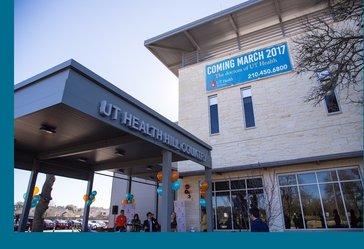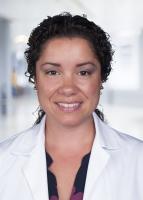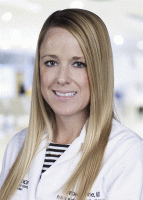UT Health Hill Country - now open!

UT Health Hill Country is the newest multispecialty outpatient office for the physician practice of The University of Texas Health Science Center, now called UT Health.
The new location is just off Interstate 10 at the Ralph Fair Road exit, a few miles south of Boerne. UT Health is excited to provide primary care, orthopaedics, physical therapy, urology and imaging capabilities to the area.
UT Health Hill Country is the newest multispecialty outpatient office for the physician practice of The University of Texas Health Science Center, now called UT Health.
The new location is just off Interstate 10 at the Ralph Fair Road exit, a few miles south of Boerne. UT Health is excited to provide primary care, orthopaedics, physical therapy, urology and imaging capabilities to the area.
“This is a beautiful area, and we’re honored to meet and serve our new neighbors in Boerne, Fair Oaks Ranch and Leon Springs,” said Ramon Cancino, M.D., M.Sc., a primary care physician and medical director for UT Health Hill Country.
UT Health Primary Care clinicians provide high-quality patient-centered care for children and adults. They partner with patients to provide comprehensive and preventive care (yearly checkup and immunizations), and treat acute conditions (illnesses and injuries) and chronic conditions (such as diabetes, high blood pressure and high cholesterol).
The location also has specialists in orthopaedic surgery, urology and behavioral health, allowing the office to treat a wide range of conditions, diseases and injuries.
One of the key features that sets this new location apart is the imaging center, which includes the latest MRI, CT, diagnostic radiography and ultrasound technologies. Patients no longer need to drive out of their way to other locations for imaging services.
Physical therapy, located on the 1st floor, offers expertise in everything from basic therapy for recovering from surgeries and injuries to treatments for balance disorders and chronic pain.
Our board-certified physicians at UT Health Hill Country are currently accepting new patients. To make an appointment, call 210-450-6800. UT Health Hill Country
25723 Old Fredericksburg Road
Boerne, TX 78015
 |
|
 |  |
|
Meet our new providers
Meet our new physicians and care team members. More compassionate experts to serve you!
Infertility and your family
Our experts have answered five common myths about fertility treatment.
In the past decade, there has been an explosion of interest and social awareness around infertility. What was once considered a private, very personal struggle, is now a relatively common topic of media attention and discussion.
National Infertility Awareness Week (April 23-29) is a campaign to spread awareness and support for families dealing with infertility. Celebrities, like model Chrissy Teigen and TV star Jimmy Fallon, have begun talking publicly about the struggles they have had to overcome to build their families.
Now that states like Texas mandate infertility insurance coverage, the issue, and impact of infertility have become easier to deal with. On the forefront of fertility science and treatment are the forward-thinking reproductive health specialists at the UT Health Reproductive Health and Fertility Center, which provides solutions and treatments to families all over Texas and the southern United States.
Whether you are planning on starting your family this year or in 10 years, it’s important to understand some of the common myths surrounding fertility treatment.
Myth 1: You must first be diagnosed as “infertile” before seeing a fertility specialist. (False)
Anyone can make an appointment with a fertility specialist, and many do for a number of reasons. People may seek out a local fertility center for egg or embryo freezing. This procedure preserves a woman’s healthy eggs or a couple’s fertilized embryos for future use. Also, those having a family history of a severe genetic disorder may automatically opt to undergo in-vitro fertilization (IVF) that can be used to prevent passing on that gene. Additionally, many people visit fertility centers for health reasons, including preserving their fertility prior to undergoing cancer treatment.
Myth 2: A couple must try to conceive naturally for one year before seeking treatment. (False)
While most physicians recommend this approach for individuals younger than 35, women over 35 shouldn’t try longer than six months before making an appointment with a fertility specialist. Both partners can more immediately undergo testing to rule out or confirm a reproductive health problem.
Also, there is no need to delay fertility treatment if either partner has a known reproductive disorder such as irregular periods, anatomical disorders or diagnosed sperm disorders.
Myth 3: Reproductive therapy is not common. (False)
Whether it’s by choice or because of an infertility diagnosis, many people are using fertility treatments to become parents. According to the Centers for Disease Control and Prevention, 11 percent of women and 9 percent of men experience difficulty with fertility. In 2014, more than 70,000 babies were born to mothers who used fertility treatments, and that number is rising.
Myth 4: All fertility centers are created equal. (False)
In the United States, there are more than 450 recognized fertility centers. Each provides different services, has different success rates and charges different fees. While no fertility practice can guarantee their treatment plan will result in a baby, it’s important to do your research before choosing a fertility specialist. Some criteria you may consider include physician experience and training, the variety of procedures offered, the total costs, insurance and payment options, on-site lab and storage services, and guidelines for accepting new patients.
Myth 5: Fertility treatment is always a costly, out-of-pocket expense. (False)
Fertility treatment requires a variety of investments, including time, emotion and money. But not all fertility treatments cost thousands of dollars. Often, reproductive health specialists will recommend the least invasive, most cost-effective fertility treatment as a first approach.
As the type of reproductive procedures become more involved, so does pricing. Costs for procedures differ at each fertility center. Some centers offer package pricing, payment plans, or financing and credit plans. Often, academic-affiliated practices, like UT Health, are able to offer more affordable pricing due to grants and other sources of funding.
Additionally, some companies and insurance plans may cover portions of the costs associated with advanced reproductive technologies, such as in-vitro fertilization (IVF).
According to board-certified reproductive endocrinologist and infertility specialist Randal Robinson, M.D., with the UT Health’s Reproductive Health and Fertility Center, every patient has a unique set of circumstances that leads them to fertility treatment. Some may be interested in only preserving their fertility; some may require only fertility medications and monitoring, while others will undergo donor embryo in-vitro fertilization. An experienced reproductive health specialist can help determine the best treatment plan for every patient’s unique circumstances.
If you are ready to grow your family, schedule an appointment with a UT Health fertility specialist at 210-450-9500.
 |  |
New: Online health library
Access to reliable, trustworthy medical advice when you need it is important, which is why we’ve added a dynamic new online health library.
Access to reliable, trustworthy medical advice when you need it is important, which is why we’ve added a dynamic new online health library to UTHealthcare.org.
Wondering about a type of medication you’ve seen advertised? Curious about that side effect your doctor mentioned during your visit, but you forgot to ask about? Our online resource can help.
The health library has sections on wellness and prevention, a symptom checker tool and a drug database. It includes a dictionary of procedures to help you better understand any tests or surgeries that may be on the horizon for you or a family member.
Animated videos and simple drawings in the new health library make complex medical terms and conditions easier to understand. You’ll also find a news section to keep you up-to-date on the latest discussions and discoveries in medicine.
Of course, the information is not considered medical advice and is not designed to replace the advice of a health care provider. Always seek the advice of your physician or other qualified health providers prior to starting any new treatment or with questions regarding a medical condition. But we hope this online tool, written by health professionals, helps answer questions and helps you feel confident about medical decisions.
To visit our online health library at UT Health, click here.
 |
|
 |  |
|
April is Sports Eye Safety Awareness Month
We’ve compiled some tips and steps to help prevent sports-related eye injuries.
April is Sports Eye Safety Awareness month. Each year, more than 25,000 children and adults seek medical care for a sports-related eye injury. UT Health Ophthalmology would like to remind you that most of these injuries can be prevented. Regular eye glasses are often insufficient to provide enough protection for rigorous sports.
Below are easy steps to protect your eyes:
- Wear proper safety goggles for racquet sports or basketball. Make sure they are labeled as with either CSA Racquet Sports or ASTM approval. This means the eyewear is tested to give you the highest level of protection.
- Youth baseball players should use batting helmets with polycarbonate face shields. Hockey players should use helmets with face masks or wire shields that are approved by the U.S. Amateur Hockey Association.
- For those individuals with prescription eye glasses needs, prescription goggles are available in many different styles and colors; such styles allow the athlete to compete safely, and are often not distinguishable from other protective eyewear.
- There is no satisfactory eye protection for boxing; however, thumbless gloves have been associated with a decrease in eye injuries.
- If the athlete has reduced vision in one eye, counsel with your ophthalmologist prior to participating in these sports to ensure safe practices for the better seeing eye.
- Polycarbonate lenses are a special material with high impact resistance against shattering – they are considered the strongest eye guards available. As such, look for that word on the label.The protective goggles may feel strange at first, but kids get used to them quickly. And remember, they are a lot more comfortable than a severe eye injury!
For any questions or help with you or your child’s eyes, call UT Health Ophthalmology at 210-450-9400 or visit us online.
 |  |
Look and feel your best this spring
Enjoy complimentary mini-consultations and learn about the exceptional care San Antonio’s leading plastic and vascular surgeons provide at UT Health. It's our Bloom into the Ideal You event, Thursday, May 4 from 5:30 – 8:00 p.m. in the medical center.
Enjoy complimentary mini-consultations and learn about the exceptional care provided by San Antonio’s leading plastic and vascular surgeons at UT Health.
Join us for the "Bloom into the Ideal You" event on Thursday, May 4, 5:30 to 8 p.m. at UT Health, 8300 Floyd Curl Dr, Suite 4-A, San Antonio, TX 78229. (Click for map.)
Schedule your appointment during the event and save on other available services offered.
RSVP at UTHealthcare.org/IdealYou or call 210-450-9220.
|
 |  |
|
More doctors, more convenience at Medical Drive
You’ll find shorter wait times and exceptional care at UT Health Medical Drive Primary Care.
Listening to patients is one of the most important things our doctors do. And many times, when our patients talk, it’s not just about their health. It’s often about making their lives easier – like shorter waiting times to see a doctor. We’re working hard on that. Our UT Health offices on Medical Drive are a great example.
The primary care practice at 3939 Medical Drive has added additional board-certified family physicians to their expert team. “While other doctors’ offices are booking appointments a month or two out, or not accepting new patients at all, our location is able to offer prompt appointments and excellent care to both new and current patients,” said James Garza, UT Health Medical Drive practice manager.
Cordelia Moscrip, M.D., Medical Drive primary care physician, said her patients often talk about how convenient the location is within the South Texas Medical Center, and that the free parking is great.
“Now that our location (Medical Drive) is staffed with eight full-time providers, including two behavioral health specialists, we are primed to provide complete care to our patients,” Dr. Moscrip said.
In recognition of its exceptional patient care, the UT Health Primary Care Center was recognized as a Patient-Centered Medical Home by the National Committee for Quality Assurance. This awarded rating is more assurance that patients will find advanced, comprehensive primary care for health needs, such as: - Prompt appointments for illnesses
- Annual wellness visits and physicals
- Immunizations and vaccinations
- Help managing chronic conditions
- Behavioral health care
- Help managing medications and more
Meet the two new expert physicians, now accepting new patients at 3939 Medical Drive:

Maureen Alvarado, D.O. Dr. Alvarado specializes in family medicine and has expertise in: - Osteopathic manipulative treatment (OMT)
- Women’s health
- Chronic condition management

Kimberly Kone, M.D.
Dr. Kone specializes in family medicine and has expertise in: - Joint injections
- Women’s health and contraceptive counseling
- Chronic disease management
- Pediatric and adolescent care
The primary care practice on Medical Drive is open Monday through Friday from 8 a.m. to 5 p.m. at 3939 Medical Drive, San Antonio, TX 78229. Map
Call 210-450-6120 for appointments.
 |  |
New: Patient satisfaction ratings
As part of our initiative to make every patient experience a great one, we’re now surveying all patients and providing the results of those surveys on our website as “star” ratings.
As part of our initiative to make every patient experience a great one, we’re now surveying all patients and providing the results of those surveys on our website as “star” ratings.
We’re proud to announce that UT Health’s physician practice-wide average is 4.8 out of 5 stars. And we’re striving to do better! These ratings and survey are a part of our efforts to be transparent and part of our efforts to continuously improve the patient experience.
We believe that transparency, which means being open, honest and clear, is one of the most important decision factors in choosing a great doctor. Transparency is also an important part of ensuring a provider is open and willing to accept and respond to feedback. That’s why we are making our ratings and patient comments available on our website.
Every UT Health patient receives a phone call or an email asking for a score on six questions about their experience. We then turn the score into a rating of one to five stars. Some of the questions include: Did the physician explain things in a way that was easy to understand? Did the physician listen carefully to you? Did the physician give you easy to understand information about your health questions or concerns?
We also ask patients to comment on what we could do to improve the experience. Comments are all anonymous and we use them – positive and constructive – to help improve the experience of all patients.
So please respond to our survey after your visit, and don’t forget to visit our website, www.UTHealthcare.org, to view star ratings for our providers.
Note: Provider must have at least 30 individual survey responses before their star-ranking score will be posted.
 |
|
|
|